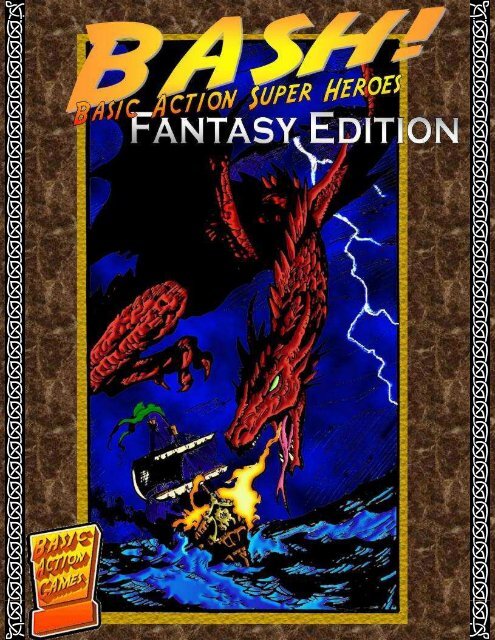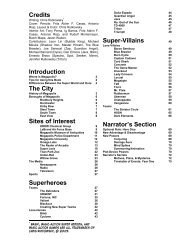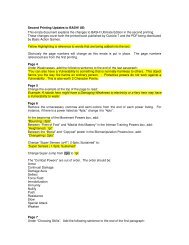BASH! Fantasy Edition - Basic Action Super Heroes
BASH! Fantasy Edition - Basic Action Super Heroes
BASH! Fantasy Edition - Basic Action Super Heroes
You also want an ePaper? Increase the reach of your titles
YUMPU automatically turns print PDFs into web optimized ePapers that Google loves.
<strong>BASH</strong>! <strong>Fantasy</strong> <strong>Edition</strong><br />
0
<strong>BASH</strong>! <strong>Fantasy</strong> <strong>Edition</strong><br />
Credits *<br />
Writing: Chris Rutkowsky<br />
Artwork: Jason Walton from Image<br />
Portfolio Anthology volume 1 and Rudolf<br />
Montemayor Image Portfolio 1.13 (Devil’s<br />
Workshop). Cover and some interior<br />
artwork copyright Paul Daly, used with<br />
permission. Some artwork in this book is<br />
also ©2005 Team Frog Studios,used by<br />
permission.<br />
Playtesters: Michael Mikulus, Andrew<br />
Mailhot, Michael Barnard, Joel Mahler,<br />
Evan Zilbert, Doug Laurora<br />
For Pap<br />
Contents<br />
Introduction & Key Terms 2<br />
Stats 3<br />
Races 3<br />
Advantages 4<br />
Disadvantages 6<br />
Powers, Mundane 7<br />
Energy 9<br />
Pushing Yourself 10<br />
<strong>Super</strong>natural Powers 10<br />
Limitations 10<br />
Casting & Spells 11<br />
Enhancements 11<br />
How does Magic Work 12<br />
<strong>Super</strong>natural Powers List 12<br />
Movement Powers 12<br />
Perception Powers 13<br />
Mental Powers 13<br />
Combat Powers 14<br />
Bio-Manipulation Powers 15<br />
Low Magic Worlds 16<br />
Colleges of Magic 16<br />
Air College 16<br />
Earth College 17<br />
Fire College 18<br />
Water College 18<br />
Light College 18<br />
Shadow College 19<br />
Universal Magic 19<br />
Skills 20<br />
Assistants 20<br />
Skill Descriptions 21<br />
Equipment 22<br />
Weapons 22<br />
Armor 22<br />
Adventuring Gear 22<br />
Equestrian Supplies 23<br />
Inn & Tavern Prices 23<br />
Magic Items 24<br />
Creating Magic Items 24<br />
Playing the Game 27<br />
Dice & Doubles 27<br />
Experience Points 27<br />
Combat Rules 27<br />
What Can I do in a Single Panel? 28<br />
The Golden Rule 28<br />
Wounds 28<br />
Non-Magic Healing 28<br />
Cover 29<br />
Knock-Back 29<br />
Wrestling 29<br />
Vulnerability 29<br />
Ships 29<br />
Siege Engines 30<br />
Collateral Damage 30<br />
Mass Combat 30<br />
Other Hazards 33<br />
Traps 33<br />
Minions 34<br />
Monsters 35<br />
Monster List 36<br />
Sample Story-Arc: “The Jewel Caravan” 48<br />
Sample <strong>Heroes</strong> 53<br />
Appendix 1: Gods & Priests 56<br />
Appendix 2: Alternate <strong>Fantasy</strong> Settings 56<br />
The Ancient World 56<br />
The Forgotten Age 59<br />
Ninjas & Samurai 61<br />
Swashbuckling 67<br />
Steam Punk 71<br />
Wild West 75<br />
Appendix 3: Converting <strong>Super</strong> Hero <strong>BASH</strong> 76<br />
*<br />
<strong>BASH</strong>! and <strong>Basic</strong> <strong>Action</strong> Games are registered<br />
trademarks of Chris Rutkowsky, ©2004, All<br />
rights reserved.<br />
1
<strong>BASH</strong>! <strong>Fantasy</strong> <strong>Edition</strong><br />
Introduction: A Heroic RPG For <strong>Basic</strong>ally Anyone!<br />
The <strong>BASH</strong>! System was a product of my attempt to invent a role-playing game that would appeal to kids. What I found,<br />
however, was that it really worked well as a super heroes RPG for gamers of all ages. I also found that the rules could be<br />
applied to genres other than super heroes. The rules are light and simple, yet expansive and precise. <strong>BASH</strong> gives a<br />
complete list of powers (both magic and mundane) without requiring the players to learn complicated formulas or<br />
memorize charts. In short, you will spend less time creating your hero, and more time playing your hero.<br />
The way that the system works is that the players roll 2 standard six-sided dice, and multiply the result by their stat or<br />
power to indicate the result relative to their opponent’s or the difficulty of an unopposed task. If the roll is “doubles”,<br />
roll another die and add it (repeat if it matches) before you multiply. The higher number is victorious. Simple, eh?<br />
Key Terms<br />
Page- One round of combat is known as a “page”.<br />
On each page, there are several “panels” that take<br />
place.<br />
Panel- During a “page”, each character takes an<br />
action, known as a panel. Panels are numbered according<br />
to the combatants’ priority<br />
Priority- The order in which heroes’ and their<br />
adversaries’ “panels” occur. This is based on whomever<br />
has the highest Agility, and is affected by super speed.<br />
Issue- The current game session, within an ongoing<br />
plot known as a story arc.<br />
Story Arc- The ultimate goal of the heroes over<br />
a given time. Once that goal is achieved, players may<br />
move on to another story arc.<br />
Stats- These are the fundamental raw aptitudes of<br />
any character. They are Brawn, Agility, and Mind. See<br />
character creation step 1 for more details.<br />
D6- An ordinary six-sided die. In this game, you often<br />
have to roll two at once.<br />
DM, Damage Multiplier- The number by<br />
which 2d6 are multiplied to determine how much damage<br />
an attack does, how much damage is soaked, or how<br />
much damage is healed.<br />
Hits-This is how much physical damage your<br />
character can withstand before being knocked out.<br />
<strong>Heroes</strong> usually begin with 100 hits. Minions have less.<br />
Doubles- When both d6s display the same<br />
number. If this happens, roll another d6 and add it. If<br />
this also matches, roll and add until it doesn’t.<br />
Soak- The amount of damage all attacks are reduced<br />
by when wearing armor, or using the armor power.<br />
Active Multiplier- The number by which any<br />
action is multiplied other than damage. The maximum<br />
active multiplier is x10.<br />
E.C. Stands for: Energy Cost. When writing down a<br />
character’s information, you should write down the E.C.<br />
next to the power if it is not simply equal to the point<br />
cost of the power.<br />
2
<strong>BASH</strong>! <strong>Fantasy</strong> <strong>Edition</strong><br />
Character Creation<br />
Step 1: Stats- Spread 7 points between each<br />
of the 3 attributes, rating 1-5. You may gain 1<br />
extra point of stats by dropping 2 points of powers<br />
to a max of 8 points for stats.<br />
Brawn- This is the character’s Strength and<br />
overall Toughness. An example of a typical person<br />
with this brawn and a description of how much they<br />
can lift is included.<br />
1- Normal Man Lift 100 Pounds<br />
2- A Black Smith 200 Pounds<br />
3- Barbarian 300 Pounds<br />
4- Barbarian Chieftain 400 Pounds<br />
5- An Ogre 500 Pounds<br />
Agility- This is how quick the character’s<br />
reflexes are. It is used to see who goes first in<br />
combat, to dodge all physical attacks, and strike in<br />
close combat.<br />
1- Normal Man<br />
2- An average swordsman<br />
3- A skilled swordsman or a pickpocket<br />
4- The most magnificent swordsman in all the land or a cat-burglar<br />
5- Greatest swordsman ever to live or the “king of thieves”.<br />
Mind- This is the character’s IQ, will power, and psychic potential. It is also used to make ranged attack damage and<br />
check perception.<br />
1- Normal Person<br />
2- Scholar<br />
3- Brilliant<br />
4- Genius<br />
5- Supra Genius<br />
Races: What fantasy RPG would be complete without them? In <strong>BASH</strong> fantasy, there can be<br />
many different sentient beings occupying the world other than humans. Elves, dwarves,<br />
halflings, and other creatures of fantasy are options for you to choose as your character’s<br />
species, hereafter referred to as “race”. Your race does not give you bonuses or penalties. It<br />
establishes a guideline of what skills or powers you should pay points for, which ones you cannot<br />
buy, and what advantages or disadvantages you should take based on what race you are playing.<br />
However, some races do enable you to buy powers normally treated as magical (gliding, super<br />
swimming) as “mundane” powers. The races here are just examples. Feel free to change or add<br />
to this list!<br />
Birdman: 1pt Gliding (counts as mundane), Cannot buy Armor Familiarity power, Max Brawn<br />
=3. Birdmen live in cliff dwellings. They have wings on their back as well as arms ending in<br />
taloned fingers.<br />
Elf: Max Brawn = 3, 1pt Charisma, Keen Senses (vision). Fairer and nobler than humans, the<br />
elves live much longer, but are far more rare. The onetime lords of civilization have declined<br />
over the centuries, and now tend to occupy wooded areas where men do not bother them.<br />
Frogfolk: 1pt fleet of foot, 1pt snatch (tongue: reach 2), 1pt <strong>Super</strong> Swimming (counts as<br />
mundane), 1pt <strong>Super</strong> Jumping (counts as mundane), Disadvantage: Freak. Frogfolk inhabit<br />
3
wanderlust.<br />
<strong>BASH</strong>! <strong>Fantasy</strong> <strong>Edition</strong><br />
swamps, ponds, and other wetlands. They look like giant frogs that walk upright and have<br />
human-like hands.<br />
Catfolk: 1pt fleet of foot, Athletics Skill (Acrobatics), 2pts Danger Sense.<br />
Minimum Agility =3. These feline humanoids look relatively human, but they have cat-like<br />
ears, eyes, and tails. They tend to be curious and it often gets them into trouble!<br />
Dwarf: Craftsmanship Skill, 2pts <strong>Super</strong> Senses (Infrared Vision, counts as mundane),<br />
Minimum Brawn =2. Short, stocky, and sturdy people, the dwarves tend to reside under<br />
the mountains, where they mine and work metal better than any other species.<br />
Halfling: Small (size -1), Max Brawn =2. Standing at half the size of a man, halflings<br />
live in country villages and make a living as subsistence farmers. Known for their hairy<br />
feet, and love of good food and comfort, halflings seldom leave their burrows to go on<br />
adventures.<br />
Half-Giant: Large (size 1), Outcast, Minimum Brawn =3. The unnatural spawn of a<br />
man and a giantess, half-giants are unwanted members in both societies, which makes<br />
them perpetual wanderers.<br />
Human: Maximum Brawn =4, Maximum Agility =4. Humans have no other restrictions<br />
and can buy whatever other stats and powers they wish.<br />
Wolfkin: 1pt Keen Senses (smell). Wolfkins are men with the heads of wolves. They<br />
live in wandering family groups called packs, and are full of loyalty to their friends and<br />
Advantages Your race is not the only important part of your<br />
background you need to determine before deciding the special abilities<br />
and skills of your character. An advantage is a special edge that grants<br />
your character some unique ability. You “buy” advantages by taking an<br />
equal amount of disadvantages, character flaws which we will discuss<br />
later.<br />
Some aspects of your character (especially social ones) are determined<br />
by buying advantages. These advantages will help you decide what kind<br />
of person your hero is, and will help you establish a guideline for buying<br />
powers later. For instance, if you want to play a wizard, you would have<br />
to buy the “Magic” advantage, while a Berserker might want the<br />
“Fearless” advantage.<br />
Blaze of GloryWhen reduced to 30 or less Hits, you get a<br />
+2 bonus on all dice rolls before multiplying. You may also take an<br />
additional panel as soon as you fall in combat (they occur<br />
simultaneously) including an extra attack even if you have already made<br />
one this page. You may also ignore the penalties for wounds for one<br />
panel by taking 10 damage.<br />
Companion- You have a companion who helps you through your<br />
adventures. A companion is essentially a weak hero controlled by the<br />
narrator. A companion does not need to be humanoid- it can be a<br />
wizard’s familiar or a knights faithful steed for instance. Companions<br />
have a base of 6 points of stats and 5 points of powers.<br />
Contacts- You know people who owe you favors all over the<br />
realm. It seems everywhere you go, you know someone who can help<br />
you out, whether it be information, a place to hide, etc. As long as you<br />
don’t ask a contact to put themselves at great risk, they will help you<br />
however they can. Contacts can really help you find out things that<br />
would otherwise remain unknown—like a villain’s whereabouts, or the<br />
4
<strong>BASH</strong>! <strong>Fantasy</strong> <strong>Edition</strong><br />
secret ritual of a cult—but you will usually get this info in the form of subtle hints—not direct information.<br />
Diehard- You are very stubborn when it comes to giving up your life. You may re-roll any dice roll that resulted in<br />
your hero’s death. Example- if you fell to your death after failing a climbing check, you can re-roll the climbing check.<br />
If you were struck down by an axe-blow, you can re-roll your dodge roll to avoid being hit, etc.<br />
Dumb Luck- Once per issue, you may re-roll any dice roll.<br />
Fearless-You are completely immune to the effects of fear, including magical effects intended to drive you away<br />
(like the Daze power). Any attempt to frighten or intimidate you automatically fails. Whenever you try to intimidate<br />
people, you add +2 to your dice rolls before multiplying.<br />
Grimoire—You are a spell caster, and you have a spell book that is the source of your powers. You do not need to<br />
use the same spells all the time, however. At the start of an issue, you can choose to learn new spells from your grimoire<br />
and discard old ones. You may trade any of your current spell powers for new ones of equal or lesser point cost. If you<br />
are adding spells you have never used in an issue before, you must make an Occult (Mysticism) check equal to 10 times<br />
the point cost of the spell you are learning. Once a spell has been added to your repertoire, you don’t need to research it<br />
again. You must have the Magic advantage to have this one.<br />
Large- You are a size 1 creature. You must be a member of a race that is much bigger than humans, like an ogre,<br />
troll, half-giant, etc. As a size 1 creature, you add +1 to all Brawn dice before multiplying, but you must subtract 1 from<br />
all Agility dice before multiplying. You also get to add 5 to all damage dealt and soaked, even if you are unarmored.<br />
Membership—You are a member of something exclusive and important, perhaps a guild, order, league, or secret<br />
society of some kind. You and your narrator must work together to figure out the benefits and obligations of this<br />
membership. It is likely that this membership will also require you to take an oath, duty, or some other disadvantage<br />
Magic—You can use magic/are magical by nature. You can purchase supernatural powers. If you are using magical<br />
colleges, this advantage only allows you to learn powers from one college. Magic has limits- you must always take a<br />
limitation that your magic powers require in order to work. In other words, you cannot cast spells with your hands tied<br />
and mouth gagged, or without your special staff, etc!<br />
Quick healer—Your natural healing is double the normal rate. This does not influence the effects of magical<br />
healing upon yourself, however.<br />
Shrewd-It is very difficult for a person to deceive, cheat, or take advantage of you. You get a +4 to dice rolls<br />
before multiplying to resist these circumstances. <br />
The Cause Choose a cause worth dying for (abolishing slavery, defending the king, etc). Whenever you do<br />
something directly for the cause, you receive a +2 bonus to your dice rolls before multiplying. This includes attack rolls,<br />
damage rolls, skill rolls, social interaction rolls—everything.<br />
Unknown AllySome mysterious stranger keeps coming to your aid whenever you are in your most desperate<br />
peril, and then disappearing with no explanation. The narrator decides all the details of this NPC, as well as how much to<br />
reveal about their true identity. <br />
Unliving- You are not alive, but either a machine, undead, or magical construct of some sort. As such, you<br />
automatically gain immunity to mind control, suggestion, and other “psionic” powers (unless the power is bought with an<br />
enhancement that allows it to affect you). You also require no food, water, sleep or oxygen, and you do not age. The<br />
downside to this is that you cannot heal normally. You cannot buy the healing power, and the physician skill cannot work<br />
on you. Instead, it takes either a successful technology or occult skill check (Narrator determines which is appropriate,<br />
use as you would medicine skill) to heal you of hits. This is obviously a slow process.<br />
VirtuousWhile you maintain your principles, you cannot be broken. You have a +4 before multiplying to resist being<br />
compelled doing anything shameful, even under torture. Example: a virtuous squire is being interrogated on the rack to<br />
reveal his master’s whereabouts. The squire gets a +4 to his dice rolls before multiplying to resist torture. You also can<br />
re-roll resistance to suggestion or mind control if compelled to do something disgraceful again. Example: an honorable<br />
knight fails his Mind check and is magically commanded to kill his ally. Before every attack roll, he gets to roll another<br />
attempt to break free of the control. It is common to have the Honor-Bound disadvantage along with this.<br />
5





